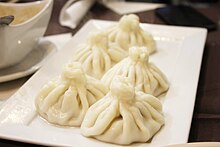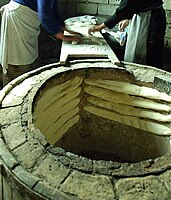Georgian cuisine
Template:Culture of Georgia s(country)
| Type | Pie |
|---|---|
| Course | appetizer/street food |
| Place of origin | Georgia |
| Region or state | Caucasus |
| Serving temperature | hot |
| Main ingredients | Cheese,bread |
| Variations | open, closed |
Georgian cuisine (Georgian: ქართული სამზარეულო; kartuli samzareulo) began about 9,000 years ago. It refers to the cooking styles and dishes created by Georgian people. The Georgian cuisine is unique to the country, but also carries some influences from other Caucasian, Eastern European and nearby Middle Eastern culinary traditions. Each historical province of Georgia has its own distinct culinary tradition, with variations such as Abkhazian, Megrelian, Kakhetian, Imeretian, Svanetian,Tushian, Kartlian, Gurian, Meskhian, Rachian and Adjarian cuisines. Rich with meat dishes, the Georgian cuisine also offers a variety of vegetarian dishes.
Georgian cuisine is the result of the broad interplay of culinary ideas carried along the Silk Road Trade route by merchants and travelers alike.[1] The importance of both food and drink to Georgian culture is best observed during a feast called supra, when a huge assortment of dishes are prepared, always accompanied by large amounts of local wine, known to be one of the world's oldest wines, produced in ancient authentic Georgian underground clay pots- Kvevris (dating 8 century BC) and that can last for hours. In a Georgian feast, the role of the tamada (toastmaster) is an important and honoured position.
Regional Cuisines
Abkhazia
Abkhazian cuisine uses a lot of spices, walnuts.
- The most popular dishes from Abkhazia are : Abysta (Porridge made of corn, similar to the Mingrelian Ghomi), Apyrpylchara (Pepper skin stuffed with walnut sauce), Achma (A variation of Khachapuri), Aritsvmgeli (Corn bread with walnut), Achash (Abkhaz chudu, with cheese), Achapa (Kidney beans with walnut).
- The most popular dessert is Akuarkuar, cookie with honey.
- The most famous Abkhaz wines are Lykhny, Apsny, Anakopia, etc,...
Adjara
Adjarian cuisine is considered as a very diversified cuisine, which was influenced by its nature (Seaside, mountainous part) and by history.
- In the mountainous Adjara, the main products are dairy products and the dishes are more fat and heavy and on the other side, in the seaside of the region, dishes are mostly spiced, and uses a lot of fresh herbs.
- The most popular dishes in Adjara are : Adjaruli Khachapuri (აჭარული ხაჭაპური), Borano (ბორანო - chopped cheese fried in ghee), Chirbuli (ჩირბული - Omelette with walnuts and tomato), Khavitsi (ხავიწი - Porridge of corn with ghee), Sinori (სინორი, Made of Nadughi and unleavened dough), Pakhlava (პახლავა - Version of the Turkish Baklava) and Shaqarlama (შაქარლამა - Biscuit),
Guria
The cuisine of Guria is based mostly on poultry meat (especially chicken meat), corn-bread (Mchadi) and on walnuts, like the cuisine of Imereti.
- The most popular dishes from Guria are : Satsivi (საცივი - Meat, mostly of chicken/turkey in walnut sauce called bazhe), Mchadi (მჭადი - Cornbread), Kupati (კუპატი - Sausage made from pork meat), Badrijani Nigvzit (ბადრიჯანი ნიგვზით - Fried eggplant with walnut sauce), Pkhali (ფხალი) and Kuchmachi (კუჭმაჭი - Chicken livers with walnut sauce and pomegranate).
Appetizers
- Abkhazura (აფხაზურა) : Caul fat rolled meatballs from Abkhazia.
- Achma (აჩმა) : Has multiple layers of cheese and bread and looks more like a sauceless lasagna.
- Ajapsandali (აჯაფსანდალი) : Traditional Georgian meal, consisted of eggplants, potatoes, onions and spices.
- Badrijnis Khizilala (ბადრიჯნის ხიზილალა) : Fried and chopped eggplants. The name means Eggplant Caviar.
- Ispanakhi (ისპანახი) : Spinach pkhali.
- Jonjoli (ჯონჯოლი) : Pickled sprouts from a bush that grows in the area.
- Khachapuri (ხაჭაპური) : Cheese-bread with regional variation. This dish is very popular outside Georgia especially in the ex-USSR.
- Khizilala (ხიზილალა) : Caviar.
- Kuchmachi (კუჭმაჭი) : Dish made of chicken livers.
- Kupati (კუპატი) : Fried sausage from Western Georgia.
- Lobiani (ლობიანი) : Bean-stuffed Khachapuri.
- Lobio (ლობიო) : Mashed beans with spices.
- Matsoni (მაწონი) : Dairy product, Greek yoghurt like.
- Muzhuzhi (მუჟუჟი) : Jelly of pork
- Nadughi (ნადუღი) : Dairy product, cream like.
- Nigzviani Badrijani (ნიგზვიამი ბადრიჯანი) : Fried eggplant and walnut sauce.
- Pkhali (ფხალი) : Minced and chopped vegetables, mostly made of spinach, beet, cabbage, etc,...
- Satsivi (საცივი) : Walnut sauce in which we can put turkey, chicken, fish meats.
-
Ajapsandali
Breads
Traditional Georgian breads are varied, and include tonis puri, khacha puri (cheese bread), Shotis Puri, mesxuri puri, and mchadi. Georgian breads are traditionally baked in a large, round, well-shaped oven called t'one.
-
Old Georgian bakery oven used to make tone bread
Cheeses
| Dambalkhacho | |
|---|---|
| Country of origin | Georgia |
| Region, town | Pshavi |
| Region | Caucasus |
| Texture | Hard |
| Aging time | Minimum: 6 months |
- Kobi kazbegi
- Kalti
- Chogi
- Sulguni
- Svaneti Sulguni
- Kazla Samegrelo Sulguni
- Imeruli
- Acharuli Chechili
- Meskhuri Chechili
- Tusheti (Guda)
- Tenili
- Dambalkhacho
Salads
Soups and stews

- Khashi
- Bozbashi
- Chakapuli
- Chakhokhbili
- Arjakeli
- Balba
- Chikhirtma
- Tolma
- Gholos
- Ispanakhis
- Kharcho
- Lobio
- Makhokhis
- Matsvnis
- Mukhudos
- Nivris
- Puris Kharsho
- Qvelis
- Satatsuris
- Shvindis
Fish
- Kalmakhi Tarkhunit
- Kephali
- Kibo Kindzit
- Kibo Mokharshuli
- Kibo Tetri Ghvinit
- Kobri Nigvzit da Brotseulit
- Loko Kindzmatshi
- Loko Tsiteli Ghvinit
- Tsotskhali
- Tsvera Nigvzit da Brotseulit
- Zutkhi Kaklis photolshi
Meat

- Abkhazura
- Shilaplavi
- Basturma
- Chakapuli
- Chanakhi
- Guphta - Georgian version of famous meatballs.
- Khashi
- Khashlama
- Khinkali
- Kutchmatchi
- Mtsvadi
- Muzhuzhi
- Khaurma
- Shila Plavi - Rice with lamb and spices...
Sauces and spices
Sauces and spices common in Georgian cuisine include:
- Ajika - a spicy paste or sauce seasoned with hot chili peppers
- Khmeli-suneli - a powdered herb/spice mixture
- Satsivi - a type of walnut sauce
- Tkemali - a type of plum sauce
Vegetarian dishes

- Ajapsandali
- Badrijani Mtsvanilit
- Badrijani Nigvzit
- Badrijnis Borani
- Badrijnis khizilala
- Ekala Nigvzit
- Gogris Guphta
- Ispanakhi
- Lobiani
- Lobio Nigvzit
- Mtsvane Lobio
- Satatsuri
- Tolma
- Tolma
Desserts
 | |
| Type | Confectionery |
|---|---|
| Place of origin | Georgia |
| Main ingredients | Grape must, nuts, flour |

- Churchkhela
- Gozinaki
- Phelamushi
- Muraba (kaklis muraba, komshis muraba, sazamtros muraba, vardis muraba, etc.)
- Nazuki
- Taphlis kveri
Wine
Georgia is one of the oldest wine-producing regions in the world. The fertile valleys and protective slopes of the Transcaucasia were home to grapevine cultivation and neolithic wine production (Georgian: ღვინო, ɣvino) for at least 8000 years.[2][3][4][5] Due to the many millennia of wine in Georgian history and its prominent economic role, the traditions of wine are considered entwined with and inseparable from the national identity.[2]
Among the best-known Georgian wine regions are Kakheti (further divided into the micro-regions of Telavi and Kvareli), Kartli, Imereti, Racha-Lechkhumi and Kvemo Svaneti, Adjara and Abkhazia.
UNESCO added the ancient traditional Georgian winemaking method using the Kvevri clay jars to the UNESCO Intangible Cultural Heritage Lists.[6]
Alcoholic drinks from Georgia include chacha and wine (especially Georgian wine). Some of the most well-known Georgian wines include Pirosmani, Alazani, Akhasheni, Saperavi, and Kindzmarauli. Wine culture in Georgia dates back thousands of years, and many Georgian wines are made from traditional Georgian grape varieties that are little known in the West, such as Saperavi and Rkatsiteli. Georgian wine is well known throughout Eastern Europe, and is a significant national export, with exports of over 10 million bottles of wine per year. Georgia is also home to many beer brands, including Natakhtari, Kazbegi, Argo, Kasri, and Karva.
Lagidze water is a Georgian flavored soda drink, made with a variety of natural syrups, sold bottled or mixed directly in a glass from a soda fountain. Common types of mineral water from Georgia include Borjomi, Nabeghlavi, Likani, and Sairme.
See also
References
- ^ Food Cultures of the World Encyclopedia, Volume 1, Ken Albala, p. 125
- ^ a b Miquel Hudin & Daria Kholodolina (2017), Georgia: A guide to the cradle of wine, Vinologue, p. 300, ISBN 978-1941598054
- ^ "Archived copy". Archived from the original on 2015-04-15. Retrieved 2015-04-15.
{{cite web}}: Unknown parameter|deadurl=ignored (|url-status=suggested) (help)CS1 maint: archived copy as title (link) - ^ CNN, By Ivan Watson,. "Unearthing Georgia's wine heritage - CNN.com". Retrieved 21 February 2018.
{{cite web}}:|last=has generic name (help)CS1 maint: extra punctuation (link) CS1 maint: multiple names: authors list (link) - ^ Spilling, Michael; Wong, Winnie (2008). Cultures of The World Georgia. p. 128. ISBN 978-0-7614-3033-9.
- ^ Georgian Winemaking Makes UNESCO Protected Heritage List RIA Novosti



